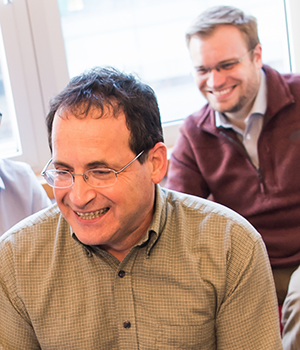
Eytan Modiano
(he/him)
Aeronautics and Astronautics
Listening and advocating
“From the moment I start working with a new student, I try to understand what their goals are,” says Professor Eytan Modiano. “This helps me guide their research, and also mentor them toward their goals.”
Modiano is Associate Director of the Laboratory for Information and Decision Systems (LIDS). His work addresses communication networks and protocols with application to satellite, wireless, and optical networks. His research group assists in the designing of network architectures that are cost effective, scalable, and robust.
Sharing failures
Students are likely to encounter many issues in graduate school. Modiano says that in his research group, “identifying and formulating the problem, is by far, the biggest challenge.” This process usually takes upwards of a year, often taking two or longer. This is “inevitably frustrating and agonizing for students,” Modiano remarks.
“There is no recipe for success, and students need to be patient and keep on trying,” he offers. “Somehow, it always seems to work in the end.”
Everyone fails, even advanced scholars like Modiano. “Certainly, I have had my share of ‘failures’ and I often tell my students about my struggles and how I overcame them,” he shares. For example, Modiano recalls that he once solved a complex research problem only to find out that someone else had just published the same result. Keeping everything in perspective, he says that “this only inspired me to work hard and obtain a much better result.”
Modiano does not think in binary terms about success and failure: “No single event, or even a series of events, is likely to define a career.” Rather, a career should be seen as a path “with ups and downs and whose trajectory we try to shape.” Modiano advises, “If you persist, you are likely to find a path that you are happy with, and meet your goals.”
Responding to students needs
When students reach out Modiano for advice, he makes time in his schedule to meet with them, usually the same day or the next. In doing so, students say that Modiano offers invaluable support and shows students that he prioritizes them.
Modiano provides his students with channels to express their difficulties (a Mentoring Guidepost identified by the C2C program). For example, he allots unstructured time during individual and group meetings for student feedback. “These weekly meetings are mainly focused on research,” Modiano says, “but I always make sure to leave time at the end to talk about anything else that is on their mind, such as concerns about their career plans, coursework, or anything else.”
Modiano also reaches out to student groups about how the department could better serve them. As Associate Director of LIDS, Modiano has responded to such feedback in a number of ways including working alongside the LIDS Social Committee to organize graduate student events. He has advocated for funding of MIT Graduate Women in Aerospace Engineering, and was a key proponent of the Exploring Aerospace Day, an event the group hosted for interested high school students.
